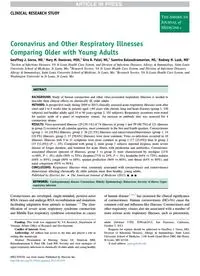
2015 Coronavirus and Other Respiratory Illnesses Comparing Older with Young Adults PDF
Preview 2015 Coronavirus and Other Respiratory Illnesses Comparing Older with Young Adults
Coronavirus and Other Respiratory Illnesses Comparing Older with Young Adults Geoffrey J. Gorse, MD,a Mary M. Donovan, MSN,b Gira B. Patel, MS,b Sumitra Balasubramanian, MS,c Rodney H. Lusk, MDa aSection of Infectious Diseases, VA St Louis Health Care System, and Division of Infectious Diseases, Allergy & Immunology, Saint Louis University School of Medicine, St Louis, Mo; bResearch Service, VA St Louis Health Care System, and Division of Infectious Diseases, Allergy & Immunology, Saint Louis University School of Medicine, St Louis, Mo; cResearch Service, VA St Louis Health Care System, and Washington University in St Louis, St Louis, Mo. ABSTRACT BACKGROUND: Study of human coronavirus and other virus-associated respiratory illnesses is needed to describe their clinical effects on chronically ill, older adults. METHODS: A prospective study during 2009 to 2013 clinically assessed acute respiratory illnesses soon after onset and 3 to 4 weeks later in patients aged �60 years with chronic lung and heart diseases (group 1, 100 subjects) and healthy adults aged 18 to 40 years (group 2, 101 subjects). Respiratory secretions were tested for nucleic acids of a panel of respiratory viruses. An increase in antibody titer was assessed for 4 coronavirus strains. RESULTS: Virus-associated illnesses (29 [39.1%] of 74 illnesses in group 1 and 59 [48.7%] of 121 illnesses in group 2) occurred in all calendar quarters, most commonly in the first and fourth quarters. Coronaviruses (group 1: 14 [18.9%] illnesses; group 2: 26 [21.5%] illnesses) and enteroviruses/rhinoviruses (group 1: 14 [18.9%] illnesses; group 2: 37 [30.6%] illnesses) were most common. Virus co-infections occurred in 10 illnesses. Illnesses with 9 to 11 symptoms were more common in group 1 (17 [23.0%]) than in group 2 (15 [12.4%]) (P < .05). Compared with group 2, more group 1 subjects reported dyspnea, more severe disease of longer duration, and treatment for acute illness with prednisone and antibiotics. Coronavirus- associated illnesses (percent of illnesses, group 1 vs group 2) were characterized by myalgias (21% vs 68%, P < .01), chills (50% vs 52%), dyspnea (71% vs 24%, P < .01), headache (64% vs 72%), malaise (64% vs 84%), cough (86% vs 68%), sputum production (86% vs 60%), sore throat (64% vs 80%), and nasal congestion (93% vs 96%). CONCLUSIONS: Respiratory illnesses were commonly associated with coronaviruses and enteroviruses/ rhinoviruses affecting chronically ill, older patients more than healthy, young adults. Published by Elsevier Inc. � The American Journal of Medicine (2015) -, --- KEYWORDS: Cardiopulmonary disease; Coronavirus; Elderly; Epidemiology; Rhinovirus; Severity of illness; Upper respiratory infection Coronaviruses are enveloped, single-stranded, positive-sense RNA viruses and undergo RNA recombination and mutations facilitating adaptation from animals to humans.1-5 The iden- tification of severe acute respiratory syndrome coronavirus and Middle East respiratory syndrome coronavirus as causes of human disease2,3,6,7 has increased the clinical significance of coronaviruses. Human coronaviruses (HCoVs) cause the common cold and influenza-like illnesses. Coronaviruses and other respiratory viruses also are associated with a number of more serious acute respiratory illnesses, such as pneumonia, Funding: This work was supported by VA Research, Department of Veterans Affairs Office of Research and Development. Conflict of Interest: None. Authorship: All authors had access to the data and played a role in writing this manuscript. Abstract Presentation at Meeting: Gorse GJ, Donovan MM, Balasubramanian S, Patel GB, Lusk RH. Severity and viral etiologies of upper respiratory infections in chronically ill older adults and young healthy adults [Abstract 1750]. IDWeek2013, San Francisco, California, October 5, 2013. Requests for reprints should be addressed to Geoffrey J. Gorse, MD, Division of Infectious Diseases, Allergy & Immunology, Saint Louis University School of Medicine, 1100 South Grand Blvd (DRC-8th Floor), St Louis, MO 63104. E-mail address:
